If you keep chickens, you’ll know that at certain times of the year, you’ll have more eggs that you know what to do with. Eggs are tricky to store long term and pickling them is one of the best ways to preserve them and deal with a glut. It goes without saying that shop-bought eggs will work just fine as well!
Chill or Preserve?
When it comes to storing your pickled eggs, some people prefer to keep them in a refrigerator. I don’t really think that’s necessary and almost defeats the object of bothering to preserve the eggs in the first place.
I do think, however, that your brining liquid needs to be almost all vinegar (some recipes call for 1 part or even more, of water), to prevent any risk of botulism.
Safe to Store
Make sure your jars are scrubbed absolutely clean in hot water and dried in an oven set on a low heat before filling.
If you use a more-or-less undiluted brine, and your jars are sterilized properly, then the eggs will be safe to store for up to 6 months in a cool, dark pantry. Avoid storing the jars anywhere too warm, or in direct sunlight.
Ingredients (per 1 quart jar)
- 12 medium eggs at room temperature
- 3 cups/700 ml vinegar (white, malt, wine or cider – I like a combination of white and balsamic)
- 1 tsp salt
- 1 – 2 tsp sugar
- 1 clove garlic (optional)
- 2 bay leaves (optional)
- 1 tbsp pickling spice (or your own choice of peppercorns, coriander seeds, fennel seeds, allspice and dried chilli/red pepper)
Instructions:
Step 1. Firstly, check over your eggs and make sure that they have no cracks on the shells.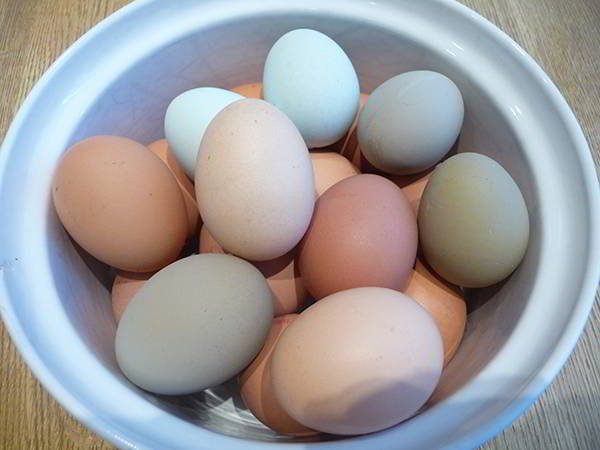
Step 2. Place the eggs into a pan of cold water, making sure that the eggs are fully submerged and bring to the boil before simmering for around 12 minutes. Remove the hard-boiled eggs and plunge into cold water. 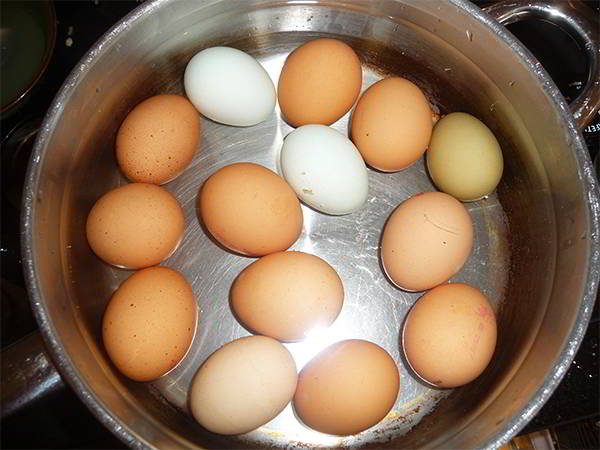
Step 3. In a separate pan, combine the vinegar, bay leaves, salt, sugar and spices and bring to the boil.
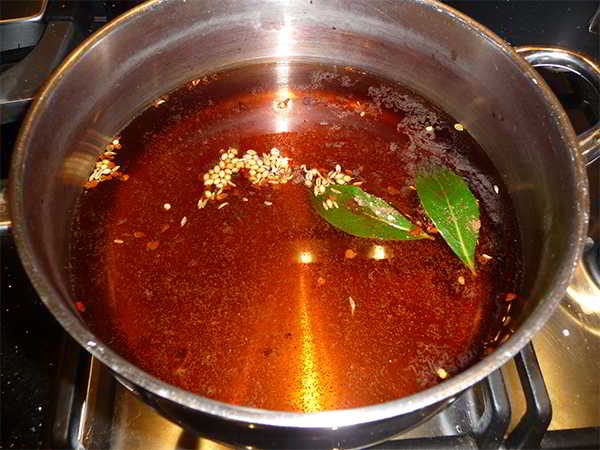 Step 4. Keep the brine on a rolling boil for 10 minutes until reduced slightly, then cool to room temperature.
Step 4. Keep the brine on a rolling boil for 10 minutes until reduced slightly, then cool to room temperature.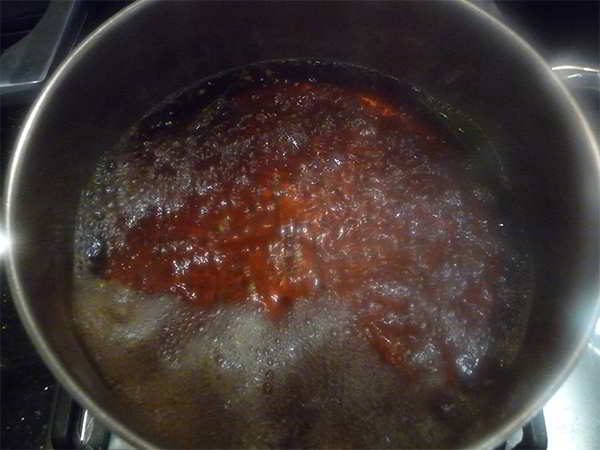
Step 5. Meanwhile, peel the eggs and place into your sterilized jar. 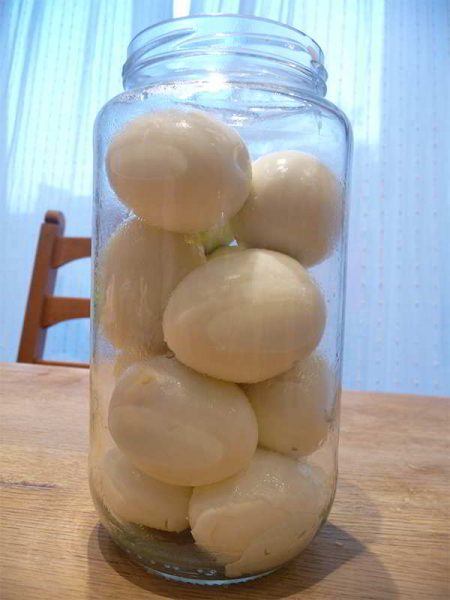
Step 6. Finally, pour the cooled brine (strained if you like, although I like to see the whole spices in there) into the jar, ensuring that the eggs are well covered by the liquid. Seal the jar tightly and give it a little shake to make sure the brine is distributed evenly before storing in a cool, dark place.
 Storage and Safety
Storage and Safety
Leave the eggs for at least two weeks before consuming. They will be safe to eat, unopened, for up to six months. Once opened, the uneaten contents should be refrigerated. Chilled, the opened eggs should last for around two weeks if kept in a lidded jar.
Pickled eggs make a simple and fantastic preserve; and a welcome and versatile change from other bottled foods.
You can eat these with bread, rice or potatoes for a simple meal, although many people simply enjoy them alone as a snack food!
You may also like:
DIY Generator (Video)
How to Keeps Eggs Fresh for Months with Mineral Oil
How to Use Acorns as Survival Food
How to Make Pine Syrup at Home (Step by Step Guide With Pictures)


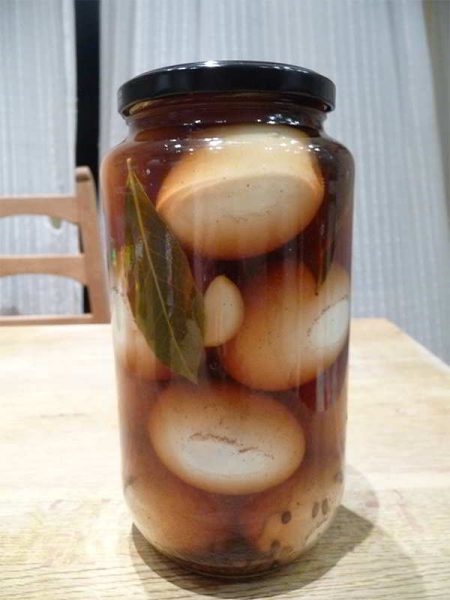 Storage and Safety
Storage and Safety







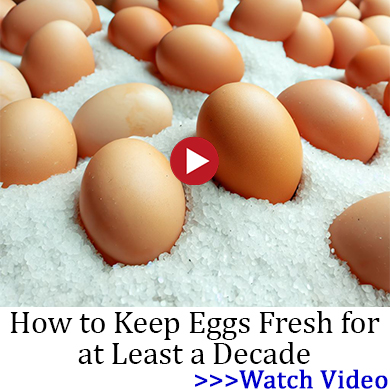


Good Information on pickling eggs. People need to know how to become self sufficient, once again, a lost art…..
The process described in this article is not as safe as it could be. Either re-post my earlier comment with revised directions, or find someone else who actually knows how to can safely to redo the article, so no one gets sick from following poor directions. Please.
Not a lost art just American ignorance
This is just wrong. If you let the jars or food or liquid cool below 212F before they are sealed they are no longer sterile, even with pure vinegar. You might as well not bother boiling them. Instead, put your clean empty jars in a water bath canner (big pot of water on gentle boil). Simmer lids gently in another pot of water. Pack boiled, cooled, peeled eggs into hot jars in water bath. Add cold vinegar and spices to eggs in jars, eggs well covered, but leave 1/2″ headspace. When vinegar in jars starts to boil, place hot lids loosely on jars in canner. let eggs and vinegar simmer in covered jars for 10-20 min, then twist lids tight, shut off the heat. After 5 min, quickly transfer jars with sealed lids into a large covered pot to cool. These properly canned eggs will be safer, and easily keep for 2-3 years if kept in the dark below 60F. This is basic stuff. never let any part of your jars, lids or food get below 212F once the process starts.
Tom, your recommendations are helpful (as I’m looking for a long term storage recipe for canning eggs), but shouldn’t the heat be turned off to allow the vinegar to quit bubbling – BEFORE twisting lids tight? Couldn’t the jars break if the vinegar is still bubbling?
I’m at ezdrill1 at g mail for if you can advise further.
What? No sliced carrots, sliced onions, and whole jalapeño peppers. Add a little spice to those delicious hard boiled eggs..
For many years of extended hunting trips with my buddies no trip was deemed complete unless a gallon jar of pickled eggs allowed to “age” for a couple weeks before the trip was included in the fare. Good stuff.
Right! We make ours with onions and Pepperchinnis.
We always used beets and vinegar. Learnong new flavors is always good.
There are many recipes for pickled eggs, but this is one of the very best recipes I’ve found. Note, when making this recipe, I fill the jar to the brim with the brine, to insure that the eggs do no’t float above the brine.
Appreciate the article, and Tom’s feedback; question tho: after SHTF, where does the vinegar come from? I’ve never seen an article on producing/making vinegar. A lil help from the community, if you please.
To make vinegar, you can use the peelings and cores of apples (or pears). You can use whole fruit, too, although it makes more sense to use the body of the fruit for something else.
Put the scraps in a clean jar, cover with water. It helps if you can weight the fruit below the water. It also helps if you can cover the top of the jar to keep out fruitflies and whatnot. I find a paper coffee filter works well, secured by a rubber band. Let sit several weeks. If it’s in a cooler place, it’ll take longer, warmer place shorter, but at least a couple weeks will be needed.
You may seed a white film form across the top. Skim that off. If you see mold like bread mold form, you’ll want to remove the moldy pieces–that mold will form when pieces are above the water line.
Some people add a little sugar because they think it speeds along the process. Some will add a little vinegar to the mix as a starter (I’d use the one with a “mother” as it’s live).
When it’s sour enough, and your nose will tell you when that is, strain the liquid from the solids.
Unless you have equipment or litmus paper that gives you pH readings, you won’t know the acidity level for sure so preserving with the homemade stuff can be dicey.
And that’s all there is to it.
Make your own apple cider, NOT Homeginezed stuff, and let it work in gallon jugs or cask with a water seal to prevent air from getting in. In afew weeks you will have hard cider which will usually turn to vinegar in a month or two. Spiking it with natural vinegar will ensure the process
An old Methodist minister who’s one was on my USFS Fire Suppression crew showed me how to do this using the brine from store bought dill pickles, usually Steinfeld brand.
Upon getting married, my wife was a great lover of green olives which are sale-priced & abundantly available @ Christmas. Because of my brining in the dill, she started to save her green olive brine. As best we can tell, it is best that we not pack the eggs in too tightly, for when we do, about two weeks in, some brine must be poured out and fresh added. Getting a good flavor at that point is strictly T&E, but the strengthened brine kept those eggs palatable for at least 6 months.
They start to taste pretty well after three weeks. I have experimented with adding minced jalapeño and Serrano peppers to good results. Some spring, I may try to waterbath can a couple of quarts to see how long the shelf life can be extended. Just remember to say grace before you consume to cover all bases.
We’ve preserved hen’s eggs exactly like this for years, but adding sliced onion to the jars with the brine. Good recipe.
We have always just put them in sterile jars and poured straight vinegar over them to fill the jar and put the lid on. Pickled eggs never last long in our house, just as they are ready the kids show up and have at them.
I read on a recipe somewhere else on the internet, that all eggs used must be completely perfect after peeling–no cracks or missing white gouged out–to ensure that salmonella or whatnot, cannot penetrate. or something like that. thought i had bookmarked it, but i don’t see it. here is another way of preserving eggs (salt curing) that some might find useful.http://www.huffingtonpost.com/entry/salt-cured-egg-yolks_us_580df595e4b02444efa41980
I’ve never made pickled eggs myself, but it seems like it is much more technical and more care needs to be taken with eggs than with anything else I’ve pickled. I’ve done sauerkraut (fermenting), pickles, onions, etc – so maybe the difference comes with the type of food – veggies vs protein based food. Makes sense. Hopefully I can build up the courage to jump into the deep end with this and try it on my own. Thanks for the recipe
I have very simply pickled eggs by popping hard boiled eggs into the “leftover” brine from (commercial) dill pickles once the cucumbers were all eaten. They were delicious within just a couple of days. I keep them in the fridge, as they were originally cold-packed pickles. I’ve probably eaten 3 dozen of them since I started perhaps six weeks ago. Over time, the brine has become a tiny bit clouded. I believe this is from eggs where the white was not 100% intact.
This method obviously doesn’t preserve them for long, but might be worth a try if you are not sure you would enjoy pickled eggs, and it’s great recycling of the brine and jar.
dUMB QUESTION, WHAT DO THEY TASTE LIKE?sAM
They mostly taste like what you spice with. Dill, olive brine, Beets, peppers, garlic mixed pickle spice, etc. Any comercial pickle juice after most of the pickles are eaten.
My old family receipe is one cup vinegar, one half cup water, one crushed bay leaf, one teaspoon mixed pickle spice, simmered toghether for a few minutes.Do not cook too long as you will boil away most of the vinegar.Place Drained canned beets in a jar and add pickle brine, let stand in a cool place for several days and enjoy. When the beets are mostly gone add peeled hard boiled eggs. You get double ue\se from the pickle juice and as kids we loved the purple eggs. after a couple weeks the egg whites will be purple clear thru and the yolks will start to color also. Enjoy
I’VE DONE PICKLED EGGS AND LOVE HOW THEY TURNED OUT!!!